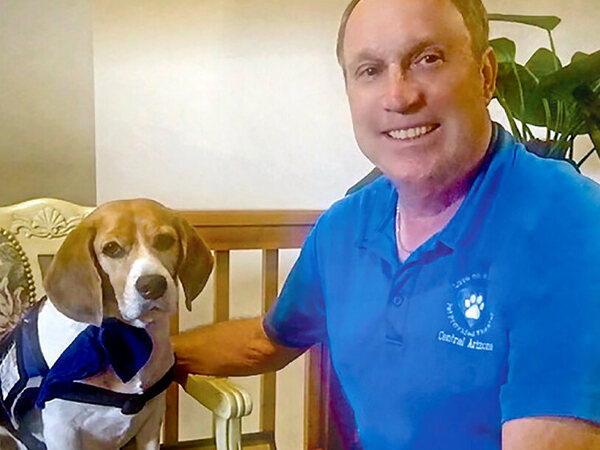
Michael and his pet beagle Shiloh work as a team offering companionship and comfort.
Diagnosis of a terminal condition brings upheaval and fear to patients and their loved ones. Feelings of disconnection and loneliness, unfortunately, can add to the fear. Pet- Assisted Therapy can help patients and their families begin to reconnect.
In my weekly patient visits in Payson, Arizona, I see what fear and loneliness can do to a family that’s not really connected. Each of us has a fundamental need to feel safely attached to another; one who will be there in our times of physical or emotional need. The goal of my visit with a patient is to engage them in their trial; to help them increase their quality of life and begin a new positive connection.
Helping patients break down walls
of loneliness and isolation

Helping patients break down walls
of loneliness and isolation
As a certified pet therapist, I work with patients assisted by my pet beagle, Shiloh. After we are introduced to a patient, Shiloh, with the patient’s approval, is placed alongside the patient in their bed or chair. As the patient strokes Shiloh’s coat or looks into the caring brown eyes of a friendly dog, their focus begins to shift from themselves to Shiloh.
The longer my four-legged colleague communes with a patient, the simpler it is to convince them to stop for just a moment, take a deep breath and relax. Perhaps Shiloh’s sweet presence helps the patient remember and reflect on a beloved childhood pet or a time when life was simpler and not as frightening.
Establishing a connection
Generally, we outwardly display what is occurring inside us, which is why our pet therapy team embodies a sense of trust, peace and the comforting feeling of being safe. Almost immediately, the patient begins to “mirror” the same positive sensations.
As the patient discerns this, it strengthens their connection with their care team. Those who often feel isolated and disconnected might begin to feel a bit better about themselves and their situation. If family, friends or staff are present, they become a part of this process.
In such a setting, some of a patient’s most painful experiences can emerge and be positively addressed, causing walls of separation between patient and family or friends to finally crumble.
Michael died unexpectedly shortly after he wrote this article. We published his article as an affirmation of his selfless work. “Mike left an enormous imprint on our Compassus program and entire community in Payson, Arizona,” says Janine M. Nielson, the bereavement and volunteer coordinator in Payson. Michael and Shiloh served more than five years with Love On A Leash, a not-for-profit organization that trains pet therapy teams.




